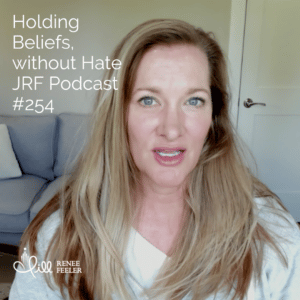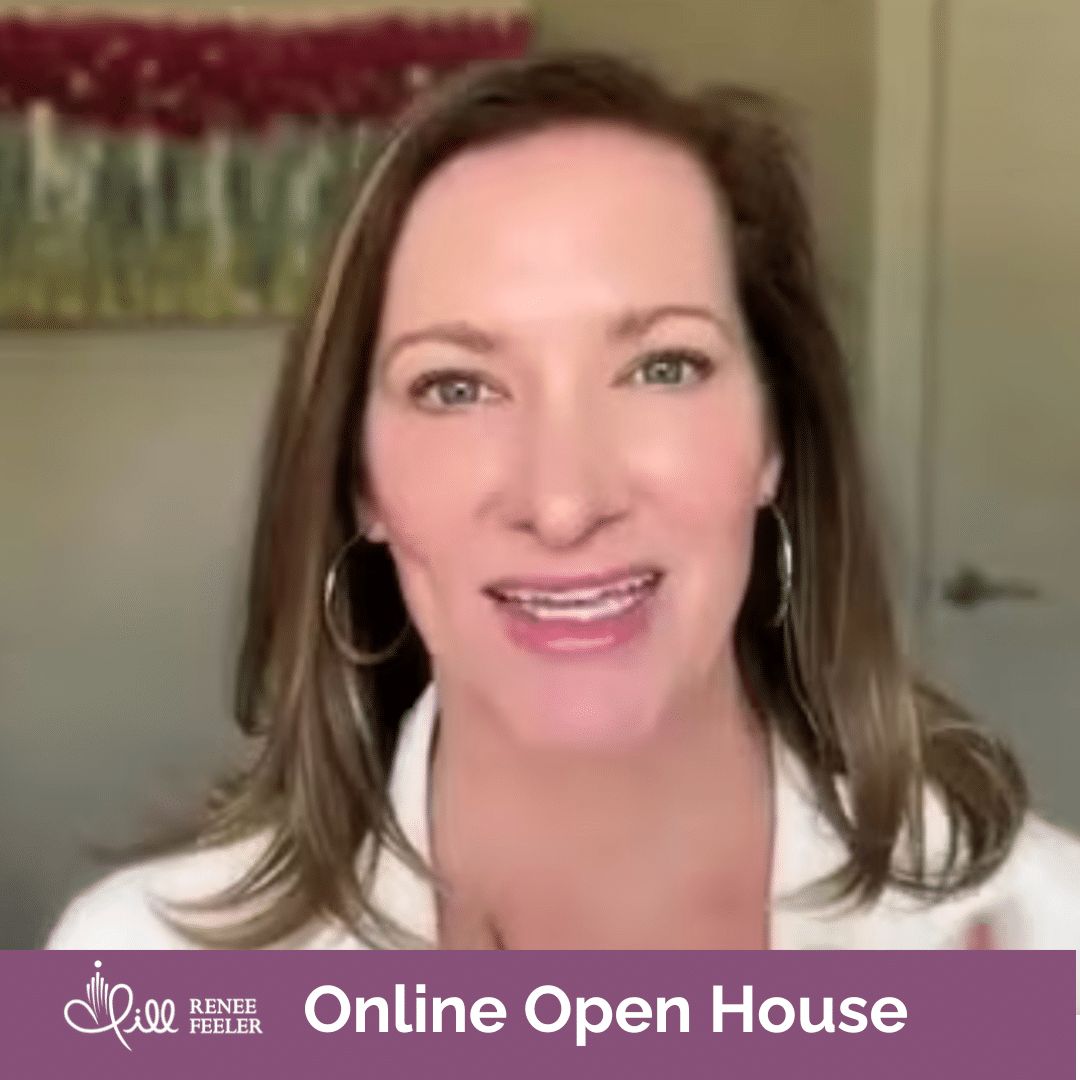 Holding Beliefs Without Hating | JRF Podcast #254
Holding Beliefs Without Hating | JRF Podcast #254
This message came through before gathering for the day during a client retreat. Hoping there is something for everyone that is striving to be less hateful, more understanding, and more peace-filled in their lives and in this world.
All beliefs are human created, beyond proof and therefore worthy of individual deliberation.
And, most humans operate within some form of belief system. So, pick a good one!
What do you want from your belief system?
Are you giving yourself permission/authority to “shop for” your best belief system?
Most belief systems offered in this reality are provided as unquestionable, true for all
and with great consequences for the unfaithful. But, is that true?
New belief systems are possible (why wouldn’t they be).
Beings can be designed to incarnate with the capacity to create (deliver? offer?) a fresh perspective on what a “higher power” is, whether there is a “Creator of Origin”, a clearer sense of what you are and others are and a sense of design and purpose of this reality/experience. That opportunity didn’t stop at certain eras of time.
And just because a being had/has that design doesn’t make them messianic. But, to the fellow humans they can be portrayed and historically recorded that way.
New belief systems are worthy of the same individual deliberation. If Creator of Origin is intending to assist the human experience in being enjoyable, productive, effective, it makes sense that improved belief systems would be offered for consideration.
Great deliberation is done individually on matters of health and well-being. One’s belief system has an even greater impact on one’s life than their choice of what gets them or keeps them healthy. Your belief system very much shapes your entire sense of self, other, reality, its purpose and whether any sense of higher/greater power is at play. It matters. Choosing well helps you be a better functioning you.
What is a belief system in this context? Religions and spirituality. Atheism. Agnosticism. Politics. Economic systems. Health regimens. Each lead to forms of often intense loyalty, division, personal identity, defined sense of self/other/authority based on unprovable, debatable (or with time “proven” incorrect) principles and/or tenets.
What qualities would *you* prefer in your belief system?
- Would you prefer to serve it, or have it serve you? (Most present forms of religion, spirituality, politics, healthy living have the believer serving it, demonstrating loyalty to it and having expectations of personal and/or societal reward.) Are your beliefs serving you, or are you serving your beliefs?
- Should it (your chosen belief system) make it easier for you to be *your* most likable, even ideal, you, or harder?
- Does it help everyone be their “best self”, or only some?
- What does the system inspire you to consider others (sinners, stupid, ignorant, victims, threats)?
- Is it a system that allows for differences of belief/opinion, or conformity?
- What happens to believers who then rebel? Are they shunned, harmed, allowed to believe as they choose without imposed consequence?
- Does the system promote non-harming individual expression and originality?
- Does the belief system bring humanity together in a harmonizing, mutually respecting manner, or seem to tear it apart into possibly hating (or even warring) factions?
Why does this matter? I’m an American. We’ve become so adept at messaging, labeling and marketing of ideas that
politics,
economic theory,
food choices,
health choices,
gender identity and
sexual preferences
have become akin to religion.
Is it directly related to the lowest rates of participation in traditional religious organizations? Possibly.
Maybe the human psyche prefers to be defined within a set of unprovable yet supremely important tenets that give the individual a sense of direction, purpose and meaning. If a traditional, religious structure isn’t doing that, maybe it is replaced with something else. And there are many other forms of organizations and activism to fill that role for them, offering that sense of personal identity, meaning, purpose and direction.
But is the belief system right? I sense that isn’t the best question, because alternative/opposing beliefs can so easily offer their own unprovable but just as compelling answer to what is “right”.
“What works,” may be the better question. “Works at what?” Precisely. What do you want the belief to do? Provide conformity, compliance? Offer individual opinion/belief, expression, personal authority, as long as it complies with laws and does no harm to others? Does it support each individual in reaching their highest potential, or only some? And in that process, does it knowingly ask for/require compromise of others?
My country feels like it is tearing itself apart from the inside out with little acknowledgement of individual accountability for how this is happening. Forced compliance of shared beliefs feels very relevant here. Members of families don’t talk to each other because of voting record, vaccination status, acknowledgment of certain identity choices, personal beliefs and what flag or sign is or isn’t displayed on one’s property. Is this new? No. This type of ideological division is an ages old, across the globe, historically evident situation. Does it feel strange and unnecessary? Yes.
Maybe this is exactly what it felt like in Munich Germany at the earliest stages of community separation/designations… except that this time it is more subjective, more ideological identity that can get you into trouble, make you ostracized, and possibly much worse.
At this point you might be intently wanting to know which ideology I am equating to the Nazi’s and to the Jews (most likely so I can be shamed in making such a comparison). Shame away. What if I am ideologically neutral, offering a perspective in which
every side
of current divisions
can identify themselves as Jews
and the others as the Nazis?
That would be some pretty powerful messaging going on within each side, wouldn’t it?
What if the souls of those that lived in Munich in pre-WWII are pleading with us to make exactly this comparison… so that we see
what we are doing
today
with our ideas about self and other
informed by our beliefs
and our belief’s compelling principles
that is another form of tearing a country, or more, apart?
And to what end?
Precisely.
“We shall see.” No, that statement implies *you* are a passive role in this story of a country. But you aren’t. You are an active participant.
Are *your* beliefs leading you to hate, admonish, demand compliance of those who feel/see/know differently than you?
Are you defensively now declaring, “but they aren’t beliefs, I am *right*, and they are *wrong*”…
says who?
You?
What if you aren’t *right*?
What if they aren’t *right* either?
Or, what if you both are, because the important matter at issue isn’t as objective as you think
or it has been presented to be
by the authority
crafting
the message,
offering the *belief*?
After a couple of breaths, after a moment to self, is there some room you can provide yourself
for a deeper sense of other,
that doesn’t bring you to hate, fail-proof methods for compliance,
and fears of societal failure if your side doesn’t prevail?
Because it may not be true, all that messaging.
Your side not winning may not be the end of world, the end of “progress”. Your side winning may be the beginning of further regression, more hatred, more attempts at forced compliance
of thought…
What comes to your mind when you imagine a country with imposed thoughts? With defined, correct ideas about what ideas, what thoughts, what attitudes are the good ones and the bad ones set not by religious institutions but by government, by laws, by enforcement?
Pleas for social media organizations to enforce correct ideas and thoughts could easily morph into the judicial branch playing that role. That could happen in so many ways. One easily imaginable scenario is the social media and even conventional non-entertainment institutions redefined as utilities, regulated by governmental bodies. If that governmental body is political, and not apolitical, those institutions then become an ideological, belief-centered forum, well-defined in its limited, divisive principles.
Do you want that?
Is your answer “yes” as long as it’s your side?
Be careful with that. History has shown us that there can be equally passionate swings in the opposite direction to reverse course.
Or, centuries of very carefully managed ideologically-centered thinking of a detailed UI, specific form. And you might be 100% certain of your rightness (not unlike proponents of Sharia law).
It works out great for those who believe in its virtues, and badly for those who do not. Our country in its albeit brief history has shown its unwillingness to conformity of belief.
“The answer is a third party,” some will chime here. Really? A third party will help us appreciate the differing beliefs of others? I doubt it. And why look to political forms to fix what it in tangible ways created? That’s like asking formerly devout Christians and Muslims to ban together to create a third belief system.
Why not look to ourselves to re-think matters of belief, what they mean to us, what they could mean to us? Why not consider that the messaging that rallies you to support your beliefs and those who uphold them makes you feel militant towards those who
believe
otherwise
and that
that
is completely unnecessary?
But your belief authorities won’t tell you that.
So don’t ask them to.
Do it for yourself.
And be as loyal as you desire to what you believe
while making room for others to do the same
without wanting to force an organization, or a governmental body, or any forced compliance to shut down, to silence, to conform them.
Just like you would want, if you were the other.
“But what if they are harming someone?” How are you defining harm? Is it the historical national definition of harm, or the new definition of harm? Are words of dissention equated to a piercing sword into your heart and soul? Is someone’s opposing belief a threat to national well-being? Or are they just opposing views, with zero physical contact? It is the growing definition of harm, hurt, injustice that is part of the heightened urgency messaging, and very much part of the problem.
A great place to start is:
- take a breath before wanting to in any way punish or demean someone from thinking differently than you.
- reach out to a former friend or loved one that *you* may have ostracized, asking them about life, living and listen to how similar their concerns and dreams may be (just differing approaches for how to achieve the goal).
- where you don’t understand the other’s side, stop trying (if you have been trying)
- where you have been trying to get the other side to understand you, stop trying.
- Instead, create space within yourself that you may never understand each other, may never believe in the same things
and that a peaceful, mutually respectful society can include huge, important concepts being disagreeable between citizens. - then read the U.S. Constitution.
- then read some of the Sharia laws.
- and carefully think through which framework you prefer, for you, and for those who believe differently than you.
Where someone offends you with their words, their ideas and/or beliefs consider that they don’t owe you an apology, you need not coerce one, you aren’t furthered by shaming them publicly nor privately and there are others to personally consider another’s differences of belief as it pertains to you.
Where someone votes or advocates differently than you that makes their views, their rights, their voice no less relevant, no less intelligent, no less intelligent, no less logical than you (regardless of what your belief authorities message/dictate).
Other citizens deserve the same freedom to believe as they are led as you are. And that may be what keeps the nation alive, instead of tearing itself apart, person by person, belief versus belief.
With gratitude,
Jill Renee Feeler
Video format plus discussion with retreat participants






Leave A Comment